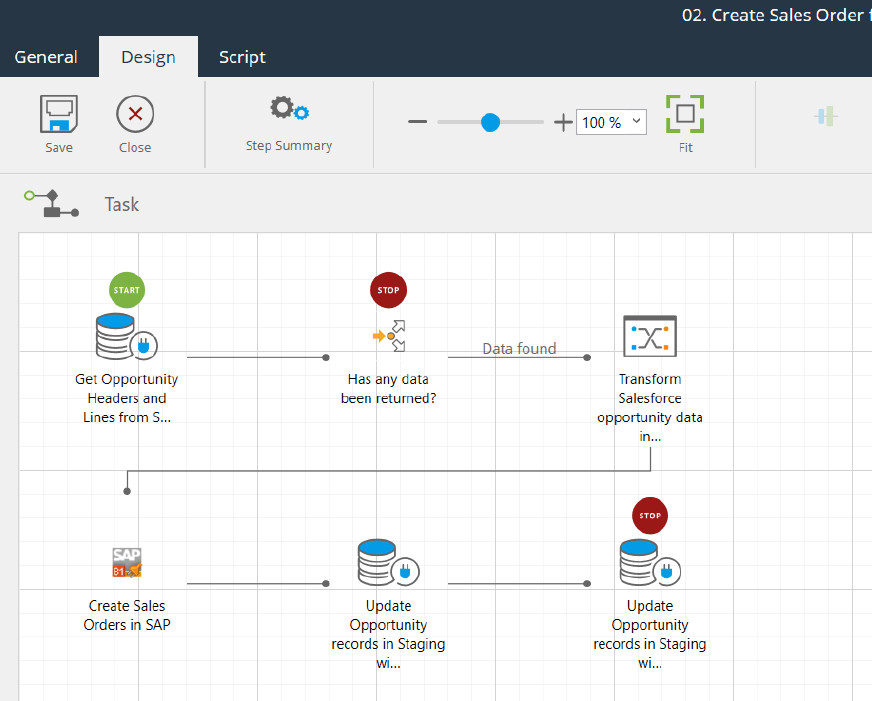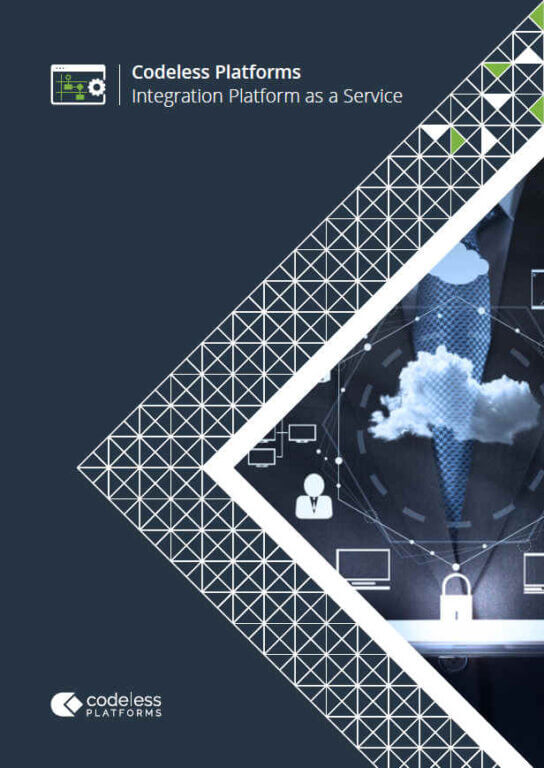Identifying the right iPaaS vendor is critical to ensuring that you get an integration solution that is flexible and secure, and provides the best ROI. This guide highlights the key factors that you need to consider.
What to look for in an iPaaS vendor
Integrating business systems to synchronise data throughout a company is essential for gaining complete insight into transactions and activity, and iPaaS (Integration Platform as a Service) has made this much easier to implement at an affordable cost.
Choosing the right iPaaS vendor to provide this essential component, however, is of paramount importance, as not only will iPaaS sit at the heart of your organisation it will also determine future strategies and development.
Selecting an iPaaS solution will obviously be defined by your business requirements, budget and future plans. However, there are certain attributes and functionality that an iPaaS company and its solution should provide to ensure that you get the best ROI.
Let’s first take a look at the actual product offering and identify what should be included in a powerful and reliable iPaaS solution.
Download Codeless Platforms' iPaaS Brochure
Top 6 criteria when selecting an iPaaS Vendor
When identifying and evaluating an iPaaS solution you should look for the following characteristics:
1. Multiple integration scenarios
Most organisations these days are using a wide-range of software, applications and services, whether on-premises or in the cloud.
Whatever your situation, an iPaaS solution should be able to accommodate multiple integration scenarios that enable you to easily integrate current business solutions, as well as provide a platform for future development and additions.
It should also be compatible with multiple cloud options, including AWS and Microsoft Azure.
At the very least, an integration Platform as a Service should deliver:
- Application-to-application integration
- Cloud-to-cloud application/service integration
- On-premises to cloud integration (hybrid cloud integration)
- On-premises to on-premises integration
- Microservices integration
- B2B integration
- EDI integration
- Mobile application integration
It is more than likely that a hybrid integration solution will be required due to the very nature of SaaS availability and adoption on top of existing on-premises and legacy systems.
Most businesses now have a mix of on-premises and multiple cloud-based applications and services, which means that iPaaS has become even more important in an organisation’s ecosystem as it will be able to connect all the disparate systems together.
A hybrid integration strategy will also accommodate subsidiaries or business partners, that may well have a mix of on-premises or cloud applications that you regularly need to synchronise data with.
A stable hybrid integration platform will help:
- Integrate any business system, application or web service
- Improve the visibility of data and information
- Remove cross-platform, multiple database administration tasks
- Provide inter-company integration capabilities
- Assist with company mergers and acquisitions
In order to achieve a hybrid integration between all these systems, API access and management is another primary factor that an iPaaS vendor must have solid knowledge and understanding of, whether this is RESTful web service integration , which removes the need for bespoke development, or SOAP web services integration.
A data integration vendor should have a proven track record of working with API integration services and being able to integrate with multiple third-party software products, whether this is accounting, CRM, eCommerce, ERP, marketing or warehouse management systems.
An iPaaS solution should also be able to support protocols such as HTTP, FTP, Open Data Protocol and Advanced Messaging Queuing Protocol.
As iPaaS is typically hosted by the iPaaS vendor or the provider, such as your IT partner, they will also automatically deploy any updates to the platform meaning that your IT department or developers don’t have to worry about complications when updating other software.
They can simply concentrate on requesting custom features and added functionality to the iPaaS that will help them improve business processes and drive the company forward.
2. Data integration, automation and management
One of the fundamental reasons for integrating business systems and applications is to share data. Therefore, an iPaaS provider must be able to support real-time processing and batch data integration, especially the ability to read, write and convert different file formats, such as XML, CSV and JSON.
Extract Transform Load (ETL) are the processes that enable you to push and pull data from an application, service, business system or database to another. Data can then be employed to process further actions or tasks, or used for business intelligence to enable you to make better business decisions.
Automating these data entry processes will help you remove repetitive manual administration tasks from employee workloads, saving your business time and money to improve performance and increase company revenue.
Download Codeless Platforms' iPaaS Brochure
3. Templates / pre-configured connectors
An established iPaaS vendor will usually be able to provide a selection of pre-built connectors and business process automation tools to speed up the integration process.
These templates and pre-built connectors will usually have been proven to work in real-life business scenarios and constantly developed and updated over time.
As well as providing integration capabilities, they will also provide a suite of tasks that are built using best practices and designed to provide the starting point towards a business process automation solution.
The templates can also be reused and/or reconfigured to replicate other integration scenarios or business processes, meaning that developers don’t have to keep creating custom integration solutions.
Using templates or pre-configured connectors will enable you to deploy projects much quicker, resulting in an immediate return of investment. Speeding up your go-to-market strategy, will help improve efficiencies, boost performance and increase turnover.
The packs should include a staging database to provide resilience between two systems. These tasks and the related staging database are then editable, enabling you to adjust them to your specific integration requirements.

Image: Pre-configured connectors or templates can contain tasks to speed up business process automation, as in this Creating a Sales Order example
4. High performance, low cost
One of the fundamental characteristics of ‘as-a-service’ offerings is the fact that it should be quicker to deploy and easier to use. An iPaaS solution should therefore provide an intuitive design and user experience (UX) for both applying integration and managing business processes.
It shouldn’t require a steep learning curve to adopt and use the product. Multiple users should be able to instigate changes rather than relying solely on developers to implement any changes or apply new processes.
It also needs to suit your exact requirements for your current situation. There is no point spending lots of money on an overblown solution that includes a multitude of features and functionality that you don’t require.
However, it does need to be fully scalable so that it can accommodate any future projects and integrations as and when your business expands. This can include integrating new applications, business systems and services, whether on-premises or cloud-based, or adding tools to enhance business process automation, notifications and data workflows.
Taking this approach will help you keep costs down, but provide you with the flexibility to chop and change as required.
5. Multi-instance vs. multi-tenant architecture
One topic that often gets overlooked when choosing an iPaaS provider is the type of architecture that the platform utilises – whether this is multi-instance or multi-tenant.
Why is this important you may ask?
Well, as iPaaS is typically hosted by the vendor or provider, it will determine where your data is stored and managed.
In a multi-tenancy architecture, your installation will be using a shared database. Whilst this makes it simpler and easier to set up, and possibly cheaper, it can be compromised, as any security breach, as well any developments or actions applied to the database, will affect all users. Which could result in serious implications.
A multi-instance architecture, however, provides each company with its own isolated database and infrastructure. This provides better availability, scalability and security.
You can therefore decide your own security measures rather than relying on one single instance that is blanket-employed by the vendor. Resources can be applied more easily and any instance issues can be limited to not affect overall performance.
Learn about multi-tenant and multi-instance
6. Security
In order to protect your data, any iPaaS solution should include powerful authentication, access control, data encryption and single sign-on integrations.
Although iPaaS should be understandable and accessible for multiple users, it does not necessarily mean that everybody has complete access to every aspect of the service. Therefore, stringent access control features need to be provided.
Built-in governance procedures that limit access to people so that they can’t build processes without your knowledge, should come as standard. Therefore, you should be able to authenticate and/or delete users as and when appropriate to track and log integration access and usage.
With this level of control you will be able to scale integration processes to different departments as well as globally, if required.
Likewise, multi-factor authentication support, including OpenID Connect, Azure Active Directory and OAuth2, is essential to provide secure access for all users.
As a consequence, iPaaS should provide you with the ability to monitor all processes and activity, and alert you about any significant changes or issues, such as too many API calls etc.
Encrypted end-to-end security is also vital to securing your data, such as double encryption using AES-256. Advanced Encryption Standard (AES), which is approved by the US National Security Agency (NSA), is a symmetric key cipher that can encrypt and decrypt a message or plaintext data using the AES algorithm and an AES key length of 256 bits.
As well as the security of multi-instance, an iPaaS solution could also provide a remote data relay system to enable seamless connectivity between your cloud and on-premises applications and resources, such as the file system. A relay system will use end-to-end security with double encryption to fully protect your data.
Download Codeless Platforms' iPaaS Brochure
Identifying the right iPaaS vendor
Having outlined the key features and functionality that an iPaaS solution should deliver, you also need to look into the actual provider of the platform to fully understand the complete package that is being offered.
Obviously, you will want to get the best service possible for the lowest cost but, at the end of the day, it often comes down to a balance of cost and performance.
Are there any hidden costs? Are there any development or consulting fees? What service levels (SLAs) and support does the company provide? Do they have a proven history in delivering digital transformation projects?
A subscription model will not only help you to reduce your costs, it also provides a more flexible approach to integration, as it will be possible to scale up your integration and business process automation requirements as the business grows and evolves.
Therefore, it is probably better to start with a small project and build your integration environment over time. This will give you a better understanding and insight into the mechanisms of the iPaaS. A confident provider should be able to offer this.
At the outset though, it is worth clearly defining your own data strategy – what do you actually need now and what will you need in the future?
Do you need to integrate legacy systems, SaaS applications, web services? What data do you need to synchronise, now and in the future?
Once you establish your system integration strategy, you will be in a much better position to select an iPaaS vendor that can fulfil your requirements.
For more information on how iPaaS can help your business, download the brochure below or call us on +44(0) 330 99 88 700.


